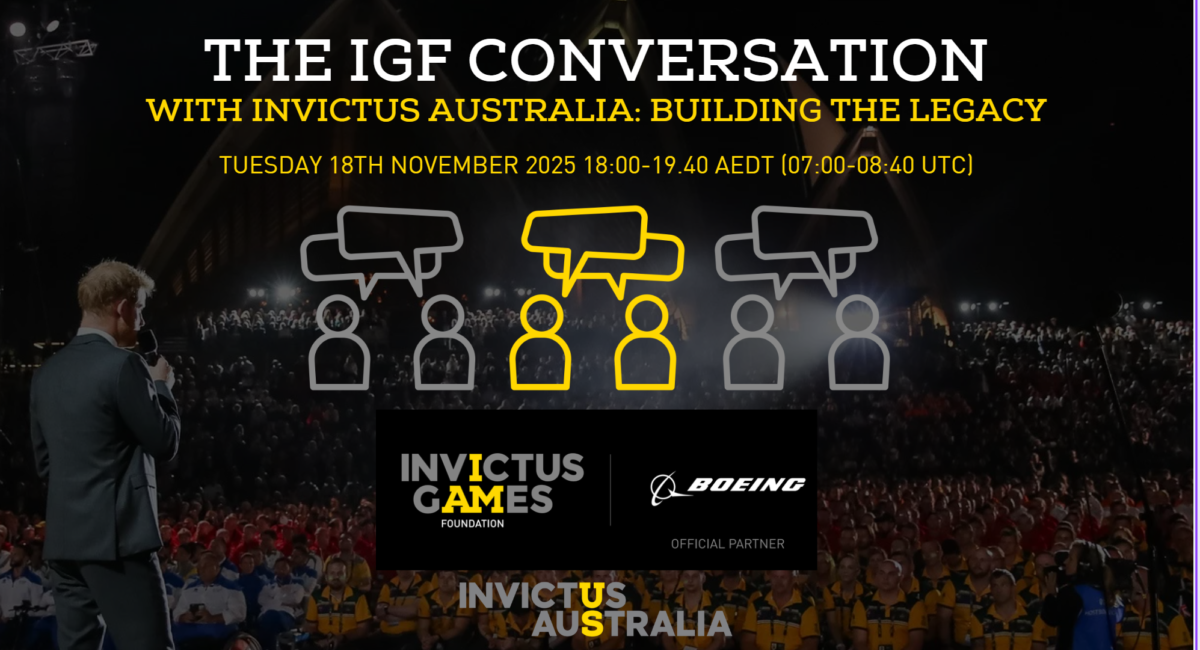The Invictus Games Foundation was delighted to host the latest instalment of its IGF Conversations series: “The IGF Conversation with Invictus Australia: Building the Legacy.” The event took place virtually on Tuesday, 18 November and, for the first time, was delivered live from the Sydney headquarters of our partners at Invictus Australia, marking a significant milestone for the global Invictus Community.
Strengthening the Legacy of the Games
This special edition explored how Invictus Australia’s model exemplifies the long-term legacy the Games can leave behind, creating sustainable and community-based recovery opportunities for wounded, injured, or sick service personnel and veterans after the Games conclude.
Reflecting on the origins of Invictus Australia, Chief Executive Officer Michael Hartung said: “The Invictus Games Sydney 2018 was a special time for Australia, it sparked interest and connection and brought communities together around the country. That moment in time was so special that we needed to turn it into something more which was a legacy programme that continues to utilise the values of the Invictus Movement.”
The discussion aligned with the Invictus Games Foundation’s strategy to build a truly global Movement and ensure recovery through sport continues beyond the Games.
Invictus Programmes Beyond the Games
The first panel, Invictus Programmes Beyond the Games: What Happens When the Lights Go Off, brought together leaders from across the Invictus Community of Nations. Speakers included Michael Hartung OAM, Chief Executive Officer of Invictus Australia; Martin Ammermann, Co-Project Lead of Invictus Games Düsseldorf 2023; and Nick Booth MVO, Chief Executive Officer of True Patriot Love Foundation in Canada.
Martin Ammermann reflected on Germany’s approach: “We wanted the Invictus Games to come to Germany with the intention of narrowing the gap between the German military and society and bring the two closer together. The Invictus Games Düsseldorf 2023 was a huge success and we wanted to prolong the purpose of the Games and that is why we founded Invictus Germany and we have been blown away by its success.”
The Value of Partnerships in the Community
The second panel explored how collaboration drives long-term impact for veterans and their families. Representatives from Boeing and Invictus Australia shared how partnerships can extend far beyond Games-time sponsorships to deliver tangible community outcomes.
Amy List, Managing Director of Boeing Defence Australia, said: “Boeing’s partnership with the Invictus Games started in Sydney and I still remember the energy and passion and the spirit that united everybody there. Boeing and our employees get so much pleasure out of contributing to the Invictus Community and helping the Invictus Spirit and we’re dedicated to helping at a grassroots level.”
Invictus Games alumnus Adam Jackson added: “Invictus Australia have done an awesome job mentoring the competitors both before the Games, giving us the tools to succeed at the Invictus Games but also after the Games. Invictus Australia is helping you Beyond the Games, as there are so many programmes out there. It’s not about the Games, it’s about what comes after. How can we inspire others to use sport for recovery.”
Impact: Talking to the Evidence Base
The final panel turned to research and the growing body of evidence that underpins the Movement. Experts from Australia, Canada, and the United States shared insights into the measurable benefits of sport on wellbeing, recovery, and community connection.
"We saw through a global literature review, the role of sport for the recovery of the defence community and we got all this literature in one place and we mapped it against government priorities and was able to show how sport can actually begin to address national priorities for veterans recovery. We can use that evidence to shift the dial on government policy and strategy making," Neil Burgin, Director of Strategy and Research at Invictus Australia, explained.
"Sport provides an opportunity to bring people together and allows them to grow and work on their skills both physical and social. This can be the springboard to long term recovery, and we have seen that having that self-determination is very important to veterans and then follows them taking on leadership roles and helping others,” Dr Celina Shirazipour added.
The IGF Conversation demonstrated that the Invictus Movement is not defined by a single event but by the enduring opportunities it creates for recovery and connection. From Sydney to Düsseldorf and beyond, the legacy of the Games continues to inspire communities and change lives, proving that when the Games stop, the community keeps going and working.
A full replay of this iteration of the IGF Conversation is available on our YouTube channel here.
